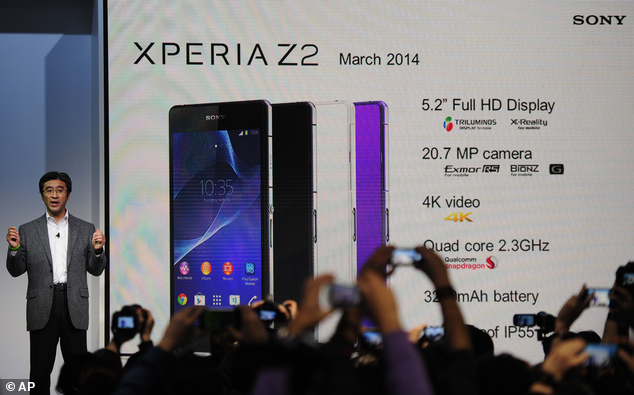<h2 style="text-align: justify">Sony Showcases HD Video Recording Phone</h2>
<p style="text-align: justify">For the last fourteen or so years, we&#8217;ve been watching digital video get better and better. By 2005, an amateur with a couple thousand dollars to spend could buy a camera like the Canon XL, which would produce movie quality video at a home video cost. In 2010, Flip cameras and their derivatives were so affordable that you could produce an HD web series for around a hundred bucks. Today, all of those devices seem outdated to the average amateur, whose cell phone packs a better video camera than the one they spent half their college fund on back in the early double-zeroes.</p>
<p style="text-align: justify">Now, if we&#8217;re being frank, real movie cameras will always have something of an edge over cell phone cameras. Simply put, a dedicated movie camera is always going to have the features that a filmmaker or videographer wants. It&#8217;s hard to attach a new lens or filter to a cell phone, and phone cameras are built for convenience above all. Someone who takes the visual component of cinema seriously will probably never want to use a cell phone camera for anything but a gimmick (say, a found-footage sequence in a movie), unless, of course, Canon for some reason decides to develop a smartphone specifically for cinematographers.</p>
<p style="text-align: justify">That said, there seems to be less and less of a reason for anyone <em>but</em> a filmmaker to invest in a dedicated video camera. One of the final nails in the coffin of the consumer video camera market may be Sony&#8217;s new phone featuring Ultra HD quality video recording. Sony has had a hard time catching up in the Apple/Samsung dominated phone industry, but the new camera may just prove to be a game changer in both the phone and HD camera markets.</p>
<p style="text-align: justify">Regardless of how the phone fares in the smartphone market, it is highly unlikely that it&#8217;s going to make much of a dent in the sales of professional grade video cameras like the Sony HDR line. Professionals want professional equipment. Even the &#8220;prosumer&#8221; market for middleweight-performance cameras sold at consumer prices isn&#8217;t likely to take much of a hit, as film students are perhaps even more precious about having professional equipment than professionals themselves are. The consumer-grade camera market, on the other hand, appeals to certain groups of people including:</p>
<ul style="text-align: justify">
<li>Amateurs</li>
</ul>
<p style="text-align: justify">If you&#8217;re not too concerned with the art of cinematography but you want to record yourself and your friends putting on funny skits, there&#8217;s little reason to spend $300 or more on a camcorder when the phone built into your camera makes it easy to produce good looking HD footage.</p>
<ul style="text-align: justify">
<li>Hobbyists</li>
</ul>
<p style="text-align: justify">If you&#8217;re not interested in video on any sort of a professional level at all, if you simply want to record your son&#8217;s birthday party to preserve the memory, then what do you really need with wide angle lenses and color filters? An HD cell phone camera sounds a lot more convenient than a heavy equipment bag full of camera parts.</p>
<p style="text-align: justify">Whether or not the phone dominates the smartphone market, it will likely set the bar a little higher for built-in cameras. The Xperia Z2 also boasts noise-cancelling technology, which should help to produce cleaner audio both during phone calls and on recorded video.</p>
<p style="text-align: justify">&#8220;Sony is a brand that has had a hard time becoming a player in the smartphone market,&#8221; said technology expert and entrepreneur Jason Hope &#8220;whether or not the new Xperia takes off, it may well leave a mark on how Apple designs and markets their phones with regards to video recording.&#8221;</p>
<p style="text-align: justify">Although cinematographers, directors and video buffs will be loath to admit it, the fact is that most people won&#8217;t really be able to tell the difference between professional footage shot on a Sony HDR, and amateur footage shot with a really good cell phone camera. A film buff might, a film professional might, but the day when every other Sundance darling is shot on credit-card sized smartphone is approaching faster than we might like to believe. You can&#8217;t replace a cinematographer&#8217;s eye for the frame with a smartphone, but the importance of expensive equipment is rapidly dissolving.</p>
<h5 style="text-align: justify">Featured images:</h5>
<ul style="text-align: justify">
<li> <span class="license">License: Creative Commons</span> <span class="source">image source</span></li>
</ul>
<p style="text-align: justify">About Author: Amy Taylor is a business and technology writer. Amy began her career as a small business owner in Phoenix, AZ. She enjoys writing about business technology trends. When she isn’t writing, she enjoys hiking with her Alaskan Malamute, Sam.</p>

Sony Showcases HD Video Recording Phone
